Tony Buck : a conversation with the Australian drummer
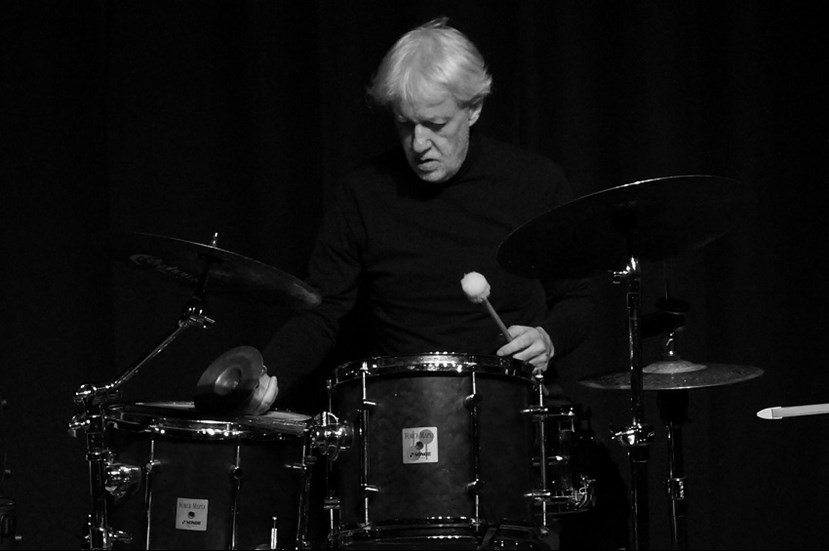
I met Tony Buck before he was due to perform with UP AND OUT quartet at the Black Box Münster on Feb. 19th, 2023.
When did you start making music ?
Tony Buck : This is an interesting question. If you mean when I started learning the instrument, I’d say, around six years old, when I was given a drum kit… As to when I started ‘making music’.. I think when I was seventeen or eighteen, and had been playing with friends in little bands I began to have a sense of what ‘making music’ was.
Have you ever thought to start a career as musician in that early stage of your life ?
Tony Buck : I am pretty sure I had that idea around the age of twelve or thirteen
What type of band did you play in, e.g. a cover band or an ordinary rock band ?
Tony Buck : It was mainly jamming with friends from school and local kids in a kind of rock band. By the time I was fifteen or sixteen I was getting more interested in more creative types of music: fusion, jazz, music from around the world. I would say that I was exposed as kid to pop and rock music. It was my interest in learning the instrument well that steered me towards finding out about jazz.
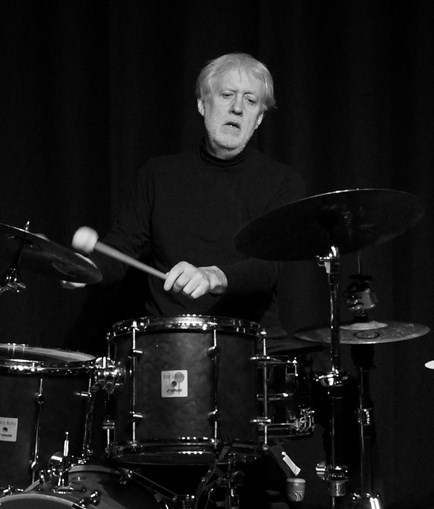
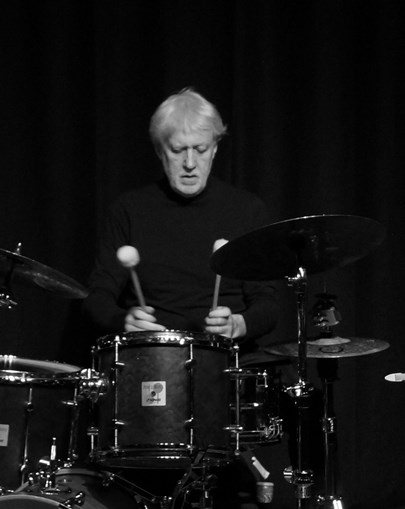
What role did your parents play in that you dedicated yourself to music and jazz/experimental music in particular ?
Tony Buck : They did not have any role at all. We did not have a record player at home until I was seven or eight. But having said that they were very encouraging. My father used to drive me to gigs when I started playing in clubs etc., at about sixteen and seventeen. They were pretty supportive but they had no idea really about what I was interested in. When I got into jazz and further into experimental music my father would sometimes say things like: “Yeah, yeah, that's all very well but why don't you do some commercial music and try to make some money.” I guess that is what all fathers would say.
Can you remember when you first came into contact with jazz ? Through radio programs, going to a concert or through a specific jazz album ? And if the latter, which album was that ?
Tony Buck : It was more from a kind of self-investigation. As I said I wanted to learn the instrument well and from that idea came the interest in Jazz and how drum kit playing developed out of that. I heard that if you want to learn it properly, get into the jazz drummers, so I searched it out. I remember as well, playing with guitar players in the late 1970th everyone listened to likes of Hendrix, Santana, John McLaughlin and Fusion stuff. If you were really interested enough to get into what inspired them it led you into Coltrane and retrospectively through the history of jazz which was a big thing. I remember thinking the first few Bebop records I bought sounded a bit old fashion to me. I did not really get where the music lay inside the sound. It took a while to decipher the language. The first record that made me think “Wow, that's what they all are talking about" was a tune on Miles Davis “Greatest Hits” a record I had. On the record there was “Seven Steps to Heaven” with a young Tony Williams and I thought that is incredible beautiful. That was my first lightbulb moment as far as real, acoustic jazz was concerned.
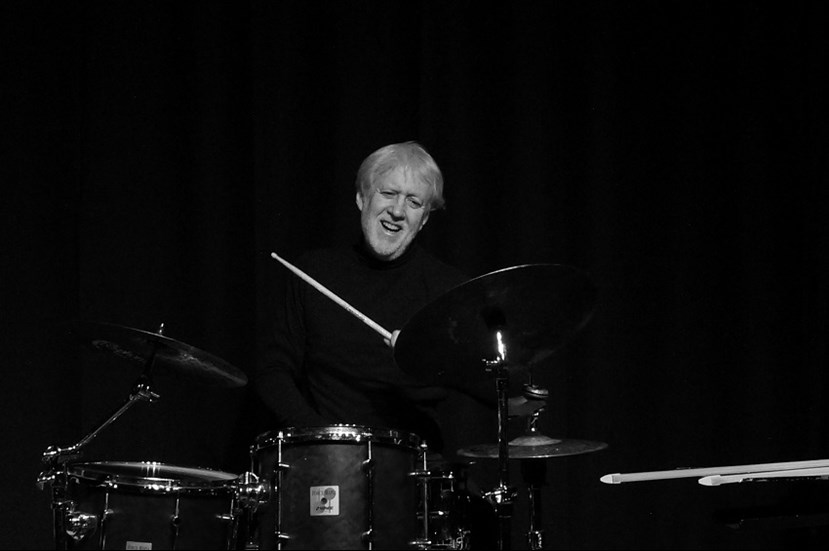
By the way, what means jazz to you ? I might refer to the following quote: “Jazz music is the power of now. There is no script. It’s conversation. The emotion is given to you by musicians as they make split-second decisions to fulfill what they feel the moment requires.” (Wynton Marsalis)
Tony Buck : Jazz is obviously an American born music, Afro-American music with a big history and evolution through the years. That is what it means to me. Improvisation is a big part of it but there are also some formal requirements and conventions in many ways, so yeah, it is a style of music.
Did your studies mainly focus on the American Songbook and the American jazz ?
Tony Buck : Yeah, I guess. Well, I started studying about 1980 the jazz course at the NSW (New South Wales State) conservatorium of music. It was a relatively new course then and mainly concentrated on the American styles of playing.
You are a member of The Necks formed and based in Sydney. How do you manage to be connected with your co-musicians considering that Berlin is your base since three decades ?
Tony Buck : We formed the group in 1986 and the idea of the band was just to play for each other, outside of public performance pressures. We concentrated on playing dynamically quite soft, improvising without solos. We played a lot, three or four times a week for about six months and in this first period we established the modus operandi we still use in a sense. We had no intention to play in public in the first place until we were asked to play a concert at the university space we rehearsed in. People responded very positively, and we decided we would play further concerts.
We were in the same country for the first four or five years or so. There were periods however where one or another of us were away for extended periods. I moved to Tokyo in 1992. Rather than stop the group we decided to use the times we did have together to record and play concerts. The philosophy of the band is really relaxed. When we are together we like to play and we use the time well. As we improvise, there is no material to rehearse. It was a bit annoying during the pandemic.
I read about the music of The Necks as Ambient Music and Dark Jazz. Would you agree or disagree and if you would disagree would you mind to explain the reasons please...
Tony Buck : I get the ambient thing - that idea of playing a music that is part of the space and environment, where the audience can move in and out of the music and experience it that way is part of what we do. I do not quite get the Dark Jazz thing. Sometimes we are mentioned as playing Post-Jazz. Labels are always applied in retrospective and don’t have an influence on the making of the music.
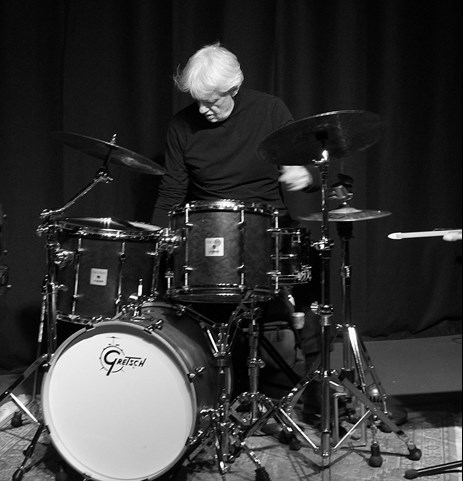
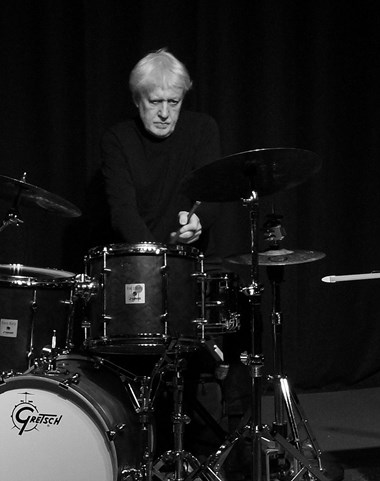
After Modern, Cool and Fusion do you still see a development in Jazz or are there only just so called remakes and adaptations nowadays ?
Tony Buck : It depends on the term jazz and what it means. There is still music played that has fresh elements and fresh inspirations under the banner of jazz. I am sure there are new things happening. I am sure there are very distinctive models, such as that of Scandinavian jazz. Perhaps The Necks way of playing is also inspiring younger generations. It is interesting.
I hear jazz today where you hear the influence of lots of different music such as Drum & Bass and techno etc. … It evolves as people respond to what’s happening around them. What jazz always seems to do is look for outside inspirations.
When you are performing solo there is nobody you can interact with. Is that a challenge and could you describe the process of sitting solo behind your drum set and playing. Are you missing the interaction with other musicians ? How do you develop the process of drumming during a solo performance ?
Tony Buck : Well, the interaction with other people you are playing with is only one type of interaction. There is as well your own interaction with your instrument. There are physical and gestural aspects and how one deals with ergonomics and movement, as well as the sound and the room. There is constant feedback generated by many aspects of your playing that you can interact and respond to.
“Spill” is a duo formation you are part of. Do you like the closeness of pairing with another musician ? How would you define your role in the duo with a lady piano player ?
Tony Buck : That is a very special duo. As soon as we started to play together 20 years ago we found out that we both had a similar syntax in the way we play and how the music would unfold. Duos are interesting. It is a very intimate way to play. I seem to be involved in many duos at the moment.
I have another duo with Axel Dörner in Berlin and we play together from time to time. We do specific things based on big slabs of timbre and deal a lot with blocks of sound. We could equally play a kind of Free Bop but we don't because we have developed a specific interest that we like to explore together. I like the projects I am involved in to have a specific reason to exist - a specific type of play to explore.
I play as well in a duo with Frank Gratkowski which I enjoy very much. We explore kind of strong, durational Free Jazz type of playing. I play as well with woman called Bex Burch, who plays a kind of Ghanaian xylophone and we explore a way of playing that deals the layering of sounds and polyrhythm.
Other current duos include playing with Italian sax player Gianni Gebbia, and Australian pianist Alister Spence.
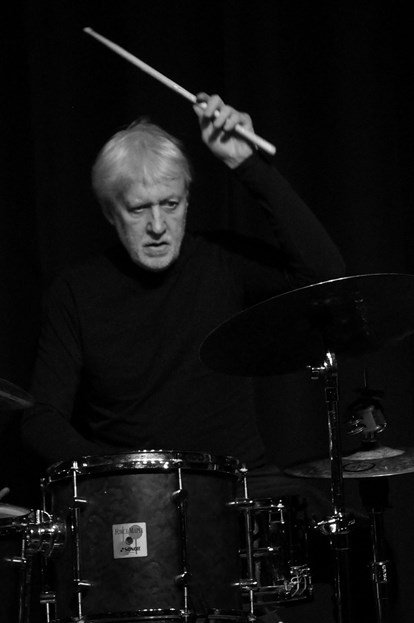
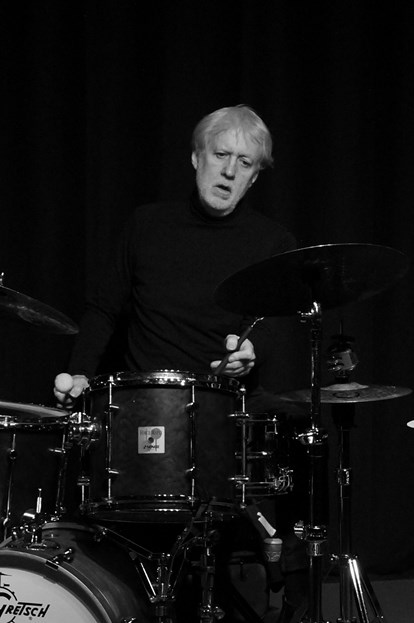
In reference to your trio with Joe Williamson and Olaf Rupp I like to quote you: 'I think the three of us in the trio try to achieve a kind of stillness through density and a certain degree of activity. Like the many complex colours and shadings in a pointillist painting that combine to form an impressionistic image, our playing is often very active and busy..." What means three dimensional texture of soundscape in the band context ?
Tony Buck : That is a quote from a very long time ago. What I was talking about was that we play, in a sense, a very busy music, with lots of sound and notes at times, that, despite all that activity, creates a kind of stillness because of the constant texture we create. Through this density there comes a kind of stillness and also a sense of depth; the three of us playing at different levels at different times where focus is shifting forward and back, like a three dimensional, crystalline form. Anyway, I think, at the time, that’s more or less what I was getting at.
Finally: What is your opinion considering the debate about cultural appropriations ?
Tony Buck : This is a big subject that it seems a lot of people have a lot to say about these days. I don’t think it’s a simple or ‘cut and dried’ subject, but it is definitely an important discussion to have.
It seems to me there are inspirations from, and collaborations with other cultures and there is the exploitation and abuse of other cultures and their practices. And those are quite different things. For example, and I guess this is relevant to this interview in the context of Jazz, the whole history of this music, it seems to me, is based on exchange of cultures and ideas. Often, especially in the early years, it has to be said, not in the most positive of circumstances — A people adapting and making do with what is available — who’s own music was suppressed and who then were dealing with instruments found around that had evolved for other purposes, etc... and a great new music was created... (to express it perhaps too simply and naively…)
At the same time there are people like Charlie Parker who was certainly interested in studying Stravinsky and getting inspirations from the Russian composer. Miles Davis and his interest in Stockhausen etc… Or Picasso’s cubism inspired by his admiration of African masks. Or someone like Antonin Artaud who was inspired by the rich Indonesian theatre, which inspired him developing his theory of the Theatre of Cruelty, which becomes a totally new and different thing... Those types of cultural interactions are really interesting and valuable. It is all a question of perspectives. At the same time there is mimicry and exploitations by a dominant culture, to mock or ridiculise or make money out of another culture, which is of course a disrespectful and exploitative situation.
Therefore I think it is an important discussion but taking a flat ‘cookie cutter’, one-size-fits-all’ perspective, often based on ignorance isn’t particularly helpful.
I thank you for the interview.
Interview and photos © Ferdinand Dupuis-Panther, 2023
http://tony-buck.com
http://tony-buck.com/portfolio/the-hanging-gardens-magda-mayas-solo/
Other
In case you LIKE us, please click here:

Foto © Leentje Arnouts
"WAGON JAZZ"
cycle d’interviews réalisées
par Georges Tonla Briquet

our partners:



Hotel-Brasserie
Markt 2 - 8820 TORHOUT

Silvère Mansis
(10.9.1944 - 22.4.2018)
foto © Dirck Brysse

Rik Bevernage
(19.4.1954 - 6.3.2018)
foto © Stefe Jiroflée
Philippe Schoonbrood
(24.5.1957-30.5.2020)
foto © Dominique Houcmant

Claude Loxhay
(18/02/1947 – 02/11/2023)
foto © Marie Gilon

Pedro Soler
(08/06/1938 – 03/08/2024)
foto © Jacky Lepage
Special thanks to our photographers:
Petra Beckers
Ron Beenen
Annie Boedt
Klaas Boelen
Henning Bolte
Serge Braem
Cedric Craps
Luca A. d'Agostino
Christian Deblanc
Philippe De Cleen
Paul De Cloedt
Cindy De Kuyper
Koen Deleu
Ferdinand Dupuis-Panther
Anne Fishburn
Federico Garcia
Jeroen Goddemaer
Robert Hansenne
Serge Heimlich
Dominique Houcmant
Stefe Jiroflée
Herman Klaassen
Philippe Klein
Jos L. Knaepen
Tom Leentjes
Hugo Lefèvre
Jacky Lepage
Olivier Lestoquoit
Eric Malfait
Simas Martinonis
Nina Contini Melis
Anne Panther
France Paquay
Francesca Patella
Quentin Perot
Jean-Jacques Pussiau
Arnold Reyngoudt
Jean Schoubs
Willy Schuyten
Frank Tafuri
Jean-Pierre Tillaert
Tom Vanbesien
Jef Vandebroek
Geert Vandepoele
Guy Van de Poel
Cees van de Ven
Donata van de Ven
Harry van Kesteren
Geert Vanoverschelde
Roger Vantilt
Patrick Van Vlerken
Marie-Anne Ver Eecke
Karine Vergauwen
Frank Verlinden
Jan Vernieuwe
Anders Vranken
Didier Wagner
and to our writers:
Mischa Andriessen
Robin Arends
Marleen Arnouts
Werner Barth
José Bedeur
Henning Bolte
Erik Carrette
Danny De Bock
Denis Desassis
Pierre Dulieu
Ferdinand Dupuis-Panther
Federico Garcia
Paul Godderis
Stephen Godsall
Jean-Pierre Goffin
Claudy Jalet
Chris Joris
Bernard Lefèvre
Mathilde Löffler
Claude Loxhay
Ieva Pakalniškytė
Anne Panther
Etienne Payen
Quentin Perot
Jacques Prouvost
Renato Sclaunich
Yves « JB » Tassin
Herman te Loo
Eric Therer
Georges Tonla Briquet
Henri Vandenberghe
Peter Van De Vijvere
Iwein Van Malderen
Jan Van Stichel
Olivier Verhelst



